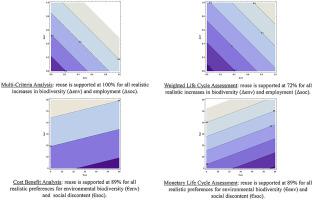当前位置:
X-MOL 学术
›
Ocean Coast Manage.
›
论文详情
Our official English website, www.x-mol.net, welcomes your feedback! (Note: you will need to create a separate account there.)
Decommissioning vs. reusing offshore gas platforms within ethical decision-making for sustainable development: Theoretical framework with application to the Adriatic Sea
Ocean & Coastal Management ( IF 4.6 ) Pub Date : 2021-01-01 , DOI: 10.1016/j.ocecoaman.2020.105409 Fabio Zagonari
Ocean & Coastal Management ( IF 4.6 ) Pub Date : 2021-01-01 , DOI: 10.1016/j.ocecoaman.2020.105409 Fabio Zagonari

|
Abstract This paper integrates ethics into decision-making for sustainable development to help planners choose between decommissioning and reuse of an offshore gas platform within a social perspective. To do so, I match multi-criteria analysis (MCA), cost–benefit analysis (CBA), weighted life-cycle assessment (WLCA), and monetary life-cycle assessment (MLCA) to four main ethical standpoints: MCA for duty to the current generation by minimising impacts (strong sustainability in a linear economy), WLCA for duty to the current and future generations by minimising impacts (strong sustainability in a circular economy), CBA for duty to the current generation by maximising welfare (weak sustainability in a linear economy), and MLCA for duty to the current and future generations by maximising welfare (weak sustainability in a circular economy). Analytical results demonstrated that reuse of the platforms is more suitable than decommissioning in a linear economy. Thus, the decision on decommissioning vs. reuse is primarily a matter of inter-generational equity. Numerical results with non-marginal assessments for a case study in the Adriatic Sea suggested that support for reuse of the platform is 100% of the solution space based on MCA , 72% based on WLCA, 89% based on CBA , and 83% based on MLCA. However, after accounting for the estimated impacts, WLCA no longer supports reuse. Thus, the decision on decommissioning vs. reuse depends secondarily on the sustainability perspective. Sensitivity analyses based on greater positive and negative perceptions of reuse and with greater social and environmental concerns showed that reuse is a robust choice with respect to perceptions (i.e., the information gap is not relevant) and concerns (i.e., stakeholder representativeness is not significant) for all sustainability paradigms and economic approaches. Therefore, the main policy implications are that the avoided decommissioning costs should be shared in terms of inter-generational distributive justice; and that employment and biodiversity benefits from reuse should be stressed within a strong sustainability perspective.
中文翻译:

在可持续发展的伦理决策中退役与再利用海上天然气平台:适用于亚得里亚海的理论框架
摘要 本文将伦理纳入可持续发展决策,以帮助规划者从社会角度在海上天然气平台退役和再利用之间做出选择。为此,我将多标准分析 (MCA)、成本收益分析 (CBA)、加权生命周期评估 (WLCA) 和货币生命周期评估 (MLCA) 与四个主要的道德观点相匹配:当前一代通过最小化影响(线性经济中的强可持续性),WLCA 通过最小化影响(循环经济中的强可持续性)对当代和后代的责任,CBA 通过最大化福利(弱可持续性)对当代人的责任线性经济),以及 MLCA 通过最大化福利(循环经济中的弱可持续性)对当代和后代的责任。分析结果表明,在线性经济中,平台的再利用比退役更合适。因此,退役还是再利用的决定主要是代际公平的问题。亚得里亚海案例研究的非边际评估数值结果表明,支持平台重用的解决方案空间 100% 基于 MCA,72% 基于 WLCA,89% 基于 CBA,83% 基于关于 MLCA。但是,考虑到估计的影响后,WLCA 不再支持重用。因此,退役还是再利用的决定其次取决于可持续性的观点。基于对再利用的更多正面和负面看法以及更大的社会和环境问题的敏感性分析表明,就看法而言,再利用是一个稳健的选择(即,信息差距与所有可持续性范式和经济方法无关)和关注点(即利益相关者代表性不显着)。因此,主要的政策含义是避免的退役成本应该在代际分配正义方面分担;应从强有力的可持续性角度强调再利用对就业和生物多样性的好处。
更新日期:2021-01-01
中文翻译:

在可持续发展的伦理决策中退役与再利用海上天然气平台:适用于亚得里亚海的理论框架
摘要 本文将伦理纳入可持续发展决策,以帮助规划者从社会角度在海上天然气平台退役和再利用之间做出选择。为此,我将多标准分析 (MCA)、成本收益分析 (CBA)、加权生命周期评估 (WLCA) 和货币生命周期评估 (MLCA) 与四个主要的道德观点相匹配:当前一代通过最小化影响(线性经济中的强可持续性),WLCA 通过最小化影响(循环经济中的强可持续性)对当代和后代的责任,CBA 通过最大化福利(弱可持续性)对当代人的责任线性经济),以及 MLCA 通过最大化福利(循环经济中的弱可持续性)对当代和后代的责任。分析结果表明,在线性经济中,平台的再利用比退役更合适。因此,退役还是再利用的决定主要是代际公平的问题。亚得里亚海案例研究的非边际评估数值结果表明,支持平台重用的解决方案空间 100% 基于 MCA,72% 基于 WLCA,89% 基于 CBA,83% 基于关于 MLCA。但是,考虑到估计的影响后,WLCA 不再支持重用。因此,退役还是再利用的决定其次取决于可持续性的观点。基于对再利用的更多正面和负面看法以及更大的社会和环境问题的敏感性分析表明,就看法而言,再利用是一个稳健的选择(即,信息差距与所有可持续性范式和经济方法无关)和关注点(即利益相关者代表性不显着)。因此,主要的政策含义是避免的退役成本应该在代际分配正义方面分担;应从强有力的可持续性角度强调再利用对就业和生物多样性的好处。


























 京公网安备 11010802027423号
京公网安备 11010802027423号